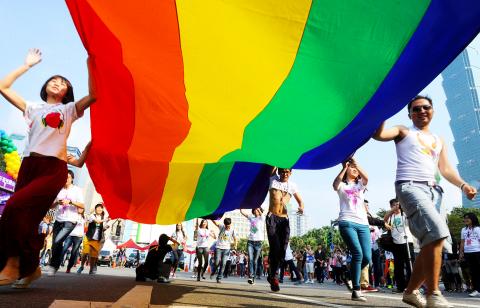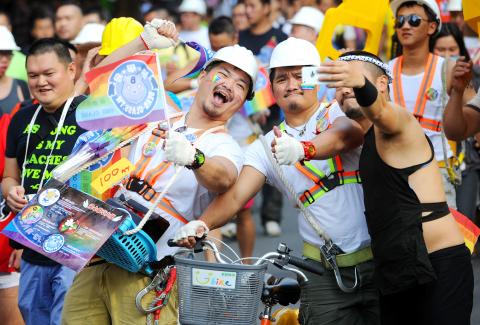Taipei will be party central on Saturday, as the annual pride parade is expected to draw tens of thousands of participants and spectators.
The Taiwan LGBT Pride Parade (台灣同志遊行), which is traditionally held on the last Saturday in October, has become the largest gay pride parade in Asia. It attracts LGBT people, friends and family members from around the nation, the region and the globe. Organizers said last year’s parade drew 80,000 people.
The parade, now in its 14th year, is the highlight of what has become a weekend of events, or week of them if you add in the Taiwan International Queer Film Festival that began on Saturday last week, the Queermosa Awards event at the W Taipei tomorrow night and the WOOW Pool Party on Sunday afternoon at the Grand Mayfull Hotel, which features DJs from Taiwan, Hong Kong and Japan and a GoGo team of dancers from Japan and Taiwan, not to mention several post-parade parties at bars and restaurants around town.

Photo: Luo Pei-der, Taipei Times
The theme of this year’s parade is “Fun together,” or as the parade Web site says: “Honor diversity, like you mean it.”
‘HONOR DIVERSITY’
The Web site says the goal is to break through “fake friendliness,” hidden discrimination and other barriers and to avoid “becoming a part of discrimination … by promoting conversations about various issues and among different groups. As long as we are a part of the society, all social issues are relevant to us.”

Photo: Luo Pei-der, Taipei Times
An English-language page on the parade Web site lists a whole raft of issues, including fighting the stigma and discrimination surrounding HIV/AIDS to promoting the rights of disabled and physically challenged individuals, noting for example that the National Theater and Concert Hall, despite their recent renovations, continue to have only half the legally required number of seats —12 — available to patrons in wheelchairs.
However, inclusiveness is not a new idea, or a new goal in the LGBT community; it is something that the Taiwan Tongzhi Hotline Association and several other groups have been working on for many years by providing support for the no-nukes campaign, the fight against the death penalty and efforts to preserve the Losheng (Happy Life) Sanitorium and help its residents.
The LGBT community has been “a powerful voice for social justice in Taiwan. It has a focus on LGBT rights, but is not limited to those issues,” said one man who has marched in several of the parades.
However, he said he expects the inclusiveness theme to be hijacked, somewhat, by the events at the Legislative Yuan this week, which saw the Democratic Progressive Party (DPP) Legislator Yu Mei-nu (尤美女) and several of her colleagues hold a news conference on Monday to pledge to renew a push to amend the Civil Code to legalize same-sex marriage. Yu said a proposed amendment had the support of 40 lawmakers, including Chinese Nationalist Party (KMT) Legislator Jason Hsu (許毓仁).
The New Power Party on Monday announced its own proposed amendments to the Civil Code and the Family Act (家事事件法) to legalize same-sex marriage and change the rules on benefits provided to relatives of government employees.
On Wednesday, Hsu announced the KMT would also submit an amendment and that KMT Legislator Wang Jin-pyng (王金平), the former legislative speaker, and 10 other legislators had cosigned the bill.
That renewed drive in the legislature is expected to be the focus of the talks at the end of the rally.
PARADE ROUTE
The start and end point of the parade is the stretch of Ketagalan Boulevard between the Ministry of Foreign Affairs and the Taipei Guest House, which means the Presidential Office Building is in the background for photographs.
A Gay Pride Village will be set up on the street, with stalls set up by charities and groups that support the LGBT community and vice versa, as well as vendors of T-shirts, rainbow flags and other merchandise.
Parade participants, who will be divided into rainbow-based color contingents, have been told to assemble at the village starting at 1:30pm, with the parade scheduled to begin an hour later.
This year there are two parade routes. The north route for the green, blue and purple contingents will take marchers along Zhongshan S Road up to Qingdao E Road to Linsen S Road to Zhongxiao E Road Sec 1 and 2 to Xinsheng S Road and then along Renai Road back to Ketagalan Boulevard.
The south route for the red, orange and yellow groups will go along Xinyi Road to Xinsheng S Road and then down Heping E Road to Roosevelt Road and then back to Zhongshan S Road and up to Ketagalan Boulevard.
A post-parade program on a stage on Ketagalan Boulevard is set to begin about 5pm as the first of the marchers return to the staging area, although if previous parades are an example, things will not really get hopping for another hour.
More information is available on the Taiwan LGBT Pride Web site (twpride.org), though most of it is in Chinese.

Cheng Ching-hsiang (鄭青祥) turned a small triangle of concrete jammed between two old shops into a cool little bar called 9dimension. In front of the shop, a steampunk-like structure was welded by himself to serve as a booth where he prepares cocktails. “Yancheng used to be just old people,” he says, “but now young people are coming and creating the New Yancheng.” Around the corner, Yu Hsiu-jao (饒毓琇), opened Tiny Cafe. True to its name, it is the size of a cupboard and serves cold-brewed coffee. “Small shops are so special and have personality,” she says, “people come to Yancheng to find such treasures.” She

Late last month Philippines Foreign Affairs Secretary Theresa Lazaro told the Philippine Senate that the nation has sufficient funds to evacuate the nearly 170,000 Filipino residents in Taiwan, 84 percent of whom are migrant workers, in the event of war. Agencies have been exploring evacuation scenarios since early this year, she said. She also observed that since the Philippines has only limited ships, the government is consulting security agencies for alternatives. Filipinos are a distant third in overall migrant worker population. Indonesia has over 248,000 workers, followed by roughly 240,000 Vietnamese. It should be noted that there are another 170,000

In July of 1995, a group of local DJs began posting an event flyer around Taipei. It was cheaply photocopied and nearly all in English, with a hand-drawn map on the back and, on the front, a big red hand print alongside one prominent line of text, “Finally… THE PARTY.” The map led to a remote floodplain in Taipei County (now New Taipei City) just across the Tamsui River from Taipei. The organizers got permission from no one. They just drove up in a blue Taiwanese pickup truck, set up a generator, two speakers, two turntables and a mixer. They

Hannah Liao (廖宸萱) recalls the harassment she experienced on dating apps, an experience that left her frightened and disgusted. “I’ve tried some voice-based dating apps,” the 30-year-old says. “Right away, some guys would say things like, ‘Wanna talk dirty?’ or ‘Wanna suck my d**k?’” she says. Liao’s story is not unique. Ministry of Health and Welfare statistics show a more than 50 percent rise in sexual assault cases related to online encounters over the past five years. In 2023 alone, women comprised 7,698 of the 9,413 reported victims. Faced with a dating landscape that can feel more predatory than promising, many in